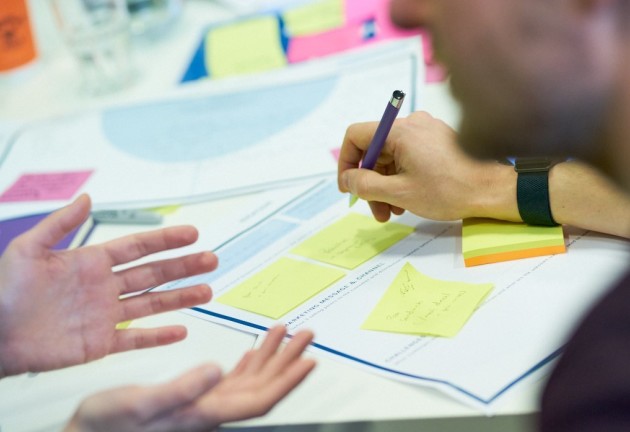Module details
- Offered to 1st years
- Tuesdays 16.00-18.00
- 8 weeks (autumn or spring term)
- Planned delivery: On campus (South Kensington)
- Non-credit only
Whether your aim is to launch a breakthrough technology on the market, or advance through the corporate career ladder, entrepreneurship is a powerful mindset and a set of tools that anyone can learn and make their own.
This module is a practical and engaging journey that combines methodologies such as Design Thinking and Lean Startup, important for anyone seeking to develop their entrepreneurial drive. We will learn how to understand customer needs, develop and test a prototype, and build a business model for your innovative idea.
At least half of classroom time, you will work in a team on a project of your choice, applying the startup founder’s toolkit to your ideas.
Information blocks
 On completion of this module, you will be better prepared to:
On completion of this module, you will be better prepared to:
- explore and develop entrepreneurial opportunities;
- build key elements of a business model in a team project;
- appraise others’ entrepreneurial thinking in a constructive way.
How should we understand customer needs and develop a product?
- Design Thinking and its stages.
- Customer development.
- Market segmentation. Customer interviews.
- Ideation and prototyping.
- Minimum viable product (MVP).
- Pitching your project.
Business Model Development
- What might be an endgame for startups?
- Key elements of a business model.
- How to prove that there is a demand for a product/ idea?
- Is your business idea financially viable? Revenue streams and unit economics.
- Is your business idea feasible? Key resources and partnerships to deliver customer experience.
- How to analyse your competitive environment?
- Case studies of platform business models (e.g. social networks, marketplaces).
Entrepreneurship is a mindset complemented by methodologies for customer-centric product design and delivery. It is successfully used in both startups and inside top global corporations to engage teams in creating value for their customer. As a STEM student, you can benefit from developing your entrepreneurial skills and knowledge of business management to have a balanced view of how new products and technologies are created.
Throughout the module, you will engage in a product business model development journey based on Design Thinking and Lean Startup methodologies. In classroom, we will split time between (a) discussing the key elements of these methodologies based on real-life cases, and (b) working in teams on your product/business idea development (startup projects). The last session of the module will be fully devoted to team pitches with Q&As.
- Coursework: Project-based group assignment – group presentation with Q&A (up to 15 minutes) and a pitch deck (minimum 8 slides). Delivered in the final session. (85%)
- Coursework: Peer assessment – written feedback form (250-350 words) submitted at the end of the last session with comments on other teams’ projects. You will be provided with advance guidance on providing feedback. You will comment on proof of demand, financial viability, and feasibility of other teams’ projects. This mark reflects the completeness and quality of your feedback to other teams. (15%)
Formative feedback will be provided by the module leader during teams’ presentations of their product and business model development in each classroom session.
Written summative feedback will be provided via the module VLE within two weeks of completion of the module. It will consist of written feedback on final team pitches from a module leader, organised around the pitches’ strengths and areas for improvement through three dimensions of the startup project (proof of demand, financial viability, feasibility).
All teams will also receive a summary of feedback from their peers for their information only; the assessment by peers does not impact the mark given by a module leader for the group assignment
- ECTS value: 0
- Requirements: You must be prepared to attend all classes and to spend about an hour a week preparing for each session
- This module is designed as an undergraduate Level 4 course. For an explanation of levels, view the Imperial Horizons Level Descriptors page.
"A huge thank you from us all for the module, we really enjoyed it and learned a huge amount! Thank you."
"This is a wonderful course for beginners who want to start a business, it not only teaches us business strategies but also lets us know how to be an entrepreneur with good values."
"I enjoyed having the chance to put some key entrepreneurship strategies into practice. What captured my attention the most was learning about the lives of real entrepreneurs, their motivations and the challenges they faced."
"I am grateful to have learned this in my first year of university."
"a wonderful experience to work in a team... an amazing tool for my future career"
"Prior to the course, I felt that entrepreneurship is only meant for creative people. However, in creating my pitch deck, I was able to experience how to develop my ideas and view the process as methodological and systematic."
Got any questions?
Contact the lecturer
Dr Igor Baranov
i.baranov@imperial.ac.uk
